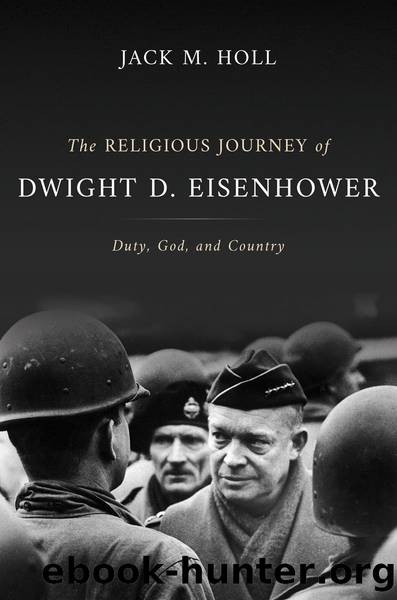The Religious Journey of Dwight D. Eisenhower: Duty, God, and Country by Jack M. Holl

Author:Jack M. Holl [Holl, Jack M.]
Language: eng
Format: epub
Tags: Biography & Autobiography, Presidents & Heads of State, Religious, Religion, Religion; Politics & State
ISBN: 9780802878731
Google: 3F8UzgEACAAJ
Goodreads: 56156113
Publisher: Eerdmans
Published: 2021-01-15T13:18:12+00:00
President in Waiting
The half decade between 1945 and 1950, and especially his brief tenure as president of Columbia University, served as an enriching sabbatical for Dwight Eisenhower. Concurrent with the growth of his religious sensibilities, Eisenhower became politically more confident and reflective. After the enormous sacrifices of blood and treasure in World War II, he was dismayed by the pell-mell demobilization of the United States following the Japanese surrender. Understandably, almost everyone pushed not only to bring the âboysâ home but also to slash military spending and limit international commitments. Increasingly, he believed no one else had the necessary experience or temperament to lead postwar America.
With hindsight, Eisenhowerâs presidency seems almost inevitable, like that of George Washington or U. S. Grant. With the possible exception of MacArthur, no hero of comparable stature to Eisenhower emerged from World War II. Talk of a presidency for Ike began as early as the North Africa campaign. During the war he consistently brushed aside any ambition of becoming president. At this juncture, he thought the presidential speculation was silly, but even to deny such ambition would make him appear to be ridiculous.
More importantly, political ambition on his part would constitute a fundamental betrayal of his duty. âFor a soldier to turn from his war duty for any reason is to be guilty of treachery to his country and disloyalty to his superiors,â he wrote his brother Arthur. âThe President is my Commander-in-Chief. Nothing could sway me from my purpose of carrying out faithfully his orders in whatever post he may assign me.â If Arthur did not get his point, Ike concluded with this: âI will not tolerate the use of my name in connection with any political activity of any kind.â
In the immediate postwar years, however, he was alternately adamant that he was uninterested in politics and coy about the possibility of running for president. Immediately after the war, both Democrats and Republicans courted Eisenhower to run on their partyâs ticket. Nevertheless, he wrote to Swede Hazlett that he could conceive of no circumstance under which he would consider accepting a political position, from âDog Catcher to âGrand High Supreme King of the Universe.ââ But while he frequently said no, he never shouted, âHell, no!â And to some, his biography Soldier of Democracy, published in 1945, looked very much like a campaign biography.
In truth, presidential talk flattered Ike, whose âlittle engine of ambitionâ was fueled by the enthusiasm of his admirers. Of course, he could not let personal ambition (selfishness) direct his life. But it might be a different matter if he were drafted to be president. The trouble was, this quintessential planner was not yet prepared to enter the hurly-burly of American politics. He had neither political staff nor regular political advisors. He had no well-defined constituency or organized support from political leaders. He had no campaign plans, no war chest or fund-raising apparatus. As a potential presidential candidate, he had neither a political base from which to run nor a platform on which to stand.
Download
This site does not store any files on its server. We only index and link to content provided by other sites. Please contact the content providers to delete copyright contents if any and email us, we'll remove relevant links or contents immediately.
| Afghan & Iraq Wars | American Civil War |
| American Revolution | Vietnam War |
| World War I | World War II |
Waking Up in Heaven: A True Story of Brokenness, Heaven, and Life Again by McVea Crystal & Tresniowski Alex(37811)
Empire of the Sikhs by Patwant Singh(23086)
We're Going to Need More Wine by Gabrielle Union(19046)
Hans Sturm: A Soldier's Odyssey on the Eastern Front by Gordon Williamson(18591)
Leonardo da Vinci by Walter Isaacson(13336)
The Radium Girls by Kate Moore(12028)
Tools of Titans by Timothy Ferriss(8396)
Educated by Tara Westover(8054)
How to Be a Bawse: A Guide to Conquering Life by Lilly Singh(7486)
Permanent Record by Edward Snowden(5847)
The Last Black Unicorn by Tiffany Haddish(5635)
The Rise and Fall of Senator Joe McCarthy by James Cross Giblin(5280)
Promise Me, Dad by Joe Biden(5153)
The Wind in My Hair by Masih Alinejad(5095)
A Higher Loyalty: Truth, Lies, and Leadership by James Comey(4964)
The Crown by Robert Lacey(4817)
The Iron Duke by The Iron Duke(4356)
Joan of Arc by Mary Gordon(4110)
Stalin by Stephen Kotkin(3965)
